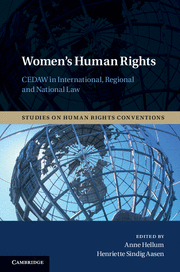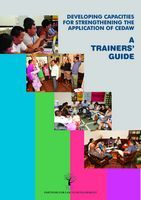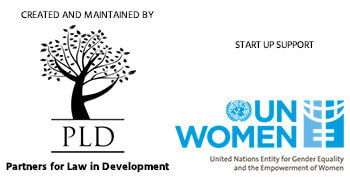Workshop organised by
Partners for Law in Development (PLD) in New Delhi
27th – 31stOctober, 2012
PLD organised a five-day residential workshop on the women’s movement’s engagement with the criminal law in addressing violence against women. The objective was to revisit the feminist legal debates around specific issues such as sexual assault, sexuality, sex work, cyber crimes relating to women; evaluate our engagement with the criminal justice system and our critically reflect on the predominant reliance on penal redress for securing gender justice. Discussions were led by resource persons such as Geeta Ramaseshan, Rebecca Mammen, Seema Misra, Pratiksha Baxi, Apoorva Kaiwar, Veena Gowda, Madhu Mehra, Albertina Almeida and others, to highlight contentious as well as inadequately addressed areas of debate. The participants in workshop comprised of lawyers, NGO workers, academics, researchers and social workers from across the country, bringing together middle level and senior activists in conversation with each other on key issues facing the women’s movement.
The workshop was not conceived as a stand-alone event. Indeed, it was designed as a space for conversations between activists across different regions, to energize and contribute to ongoing debates on law reform. In keeping with that spirit, we are circulating this note to flag some areas that emerged as needing greater attention within the community. Although not comprehensive, these concerns speak to contemporary engagement of the women’s movement with the law. We share these to elicitviews/ thoughts, and to contribute to the ongoing debates on these areas.
• Revisiting Criminal Justice: There is a huge gap between the practice of the criminal law in the pre-trial and trial stage, and the substance of the law. Both activists and academics have paid considerable attention to the substance of the law, as a result there is little documentation of the practice and procedure that impacts our ability to intervene in that domain. A similar gap exists with respect to the appellate court judgments which have been the focus of research, in contrast with the relative neglect of the trial court judgments. Our engagement with criminal procedure has not been robust enough, neglecting issues of evidence collection, the role of police, prosecution, preparation of witnesses/ victims and other such details that are essential for successful prosecution.
• The Persistence of Morality, Chastity and Indecency: The women’s movement has continuously problematized these terms and has resisted the framing of laws on sexual assault in these terms.Yet these concepts continue to inform other areas of criminal law that remain largely unchallenged. The offences of adultery and bigamy, it came across, are used in a range of manipulative ways and in a number of contexts that work against the interests of women. Increasingly, morality based concepts have found reinforcement in the new laws relating to cyber-crimes against women, penalty for false cases of sexual harassment at the workplace, amongst others. Even as the emerging legal discourse is entrenching the concept of good and bad women, our critique remains limited to some laws and provisions but not others.
• Silence around Sex Work:Though sexuality has been a central issue in feminist debates, there remains a discomfort with sex that is dissociated from romantic love and marriage. The debates around sex work continue to take place within the framework of trafficking or rescue & rehabilitation, and do not speak to the growing assertions for rights and dignity by sex workers themselves. The current debates focusing on abolition/ criminalization of sex work have very little space to articulate the nuanced positions that sex workers’ collectives are taking with respect to work, agency, choice and violence. There is need for renewed efforts to broaden this space.
• Reparations, including Compensation for Criminal Injuries: remains a neglected area in activism. Although financial compensation, support services, shelter are part of the State’s obligation to secure justice to victims of gender based crimes, there has been little information and considerable discomfort with regard to the idea of compensating victims of sexual violence. The focus of discussions have been on redefining certain offences such as sexual assault or sexual harassment, paying little attention to what the victim might want beyond conviction of the offender. Has the time come to re-imagine the goals of criminal justice in the area of violence against women? While a nascent discussion on compensation has begun, it is taking place without any reference to the feminist/ human rights understanding of reparation. There needs to be more discussions on this within the women’s movement.
• Grounded research for evidence based Advocacy: There is a strong need for documentation and building up an evidence base, which would help us (a) documenting and analyzing the functioning of the law and the extent to which it responds to women’s realities, (b) in taking informed positions on existing and emerging questions and (c) in our advocacy efforts while facing the State or even our detractors. There is an urgent need for more systematic, empirically grounded research in the issues that we work on. New areas such as cyber crimes or surrogacy are fast developing, and we need to be part of these debates.
• Campaigns and Cross-Sectoral Conversations: Although there was an acknowledgement that the mainstream women’s movement has not engaged that much with questions of marginalised sections among women, such as working class, Dalit, Adivasi, sex worker, lesbian and disabled women, creations of spaces for dialogue is definitely possible and must be pursued seriously. Instead of pursuing separate law reform campaigns, there needs to be greater conversations between different sectors, such as women’s groups working on rape law reform and Dalit groups mobilizing on sexual offences under the Atrocities Act.The focus on institutional gender bias which no doubt is important, has not allowed us to work on institutional reform that has impacts across sectors, leading us instead to seek special structures to respond to women or Dalits or disabled. This trend, which is visible across sectorsis coming in the way of equipping justice institutions to address intersectional and cross cutting violations effectively. We need to join hands in addressing weaknesses in prosecution, evidence collection etc. and other systemic failures.
• Institutional Mechanisms: While our focus has been mostly on courts, and to some extent police stations, other institutional fora such as women’s commissions, both at the national and state levels have escaped scrutiny. The experience of individual activists and women’s organisations in different parts of the country in working with the commissions need to be documented.
PLD Team
November 2, 2012
Highlights of PLD workshop on VAW and the law
TAGS:










